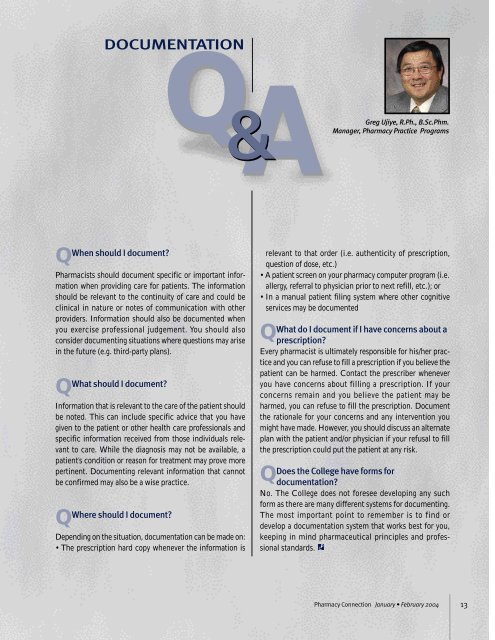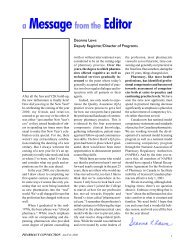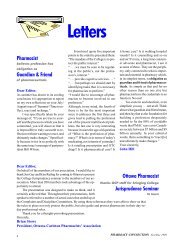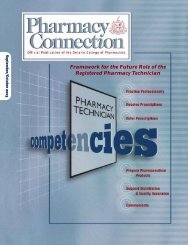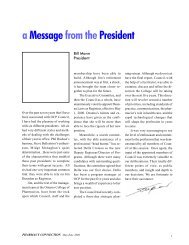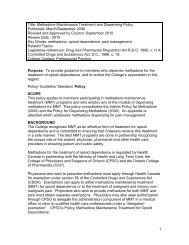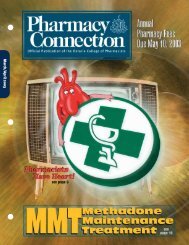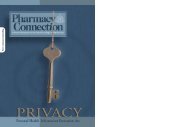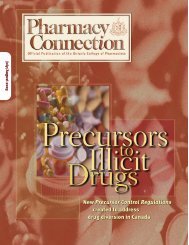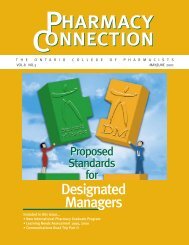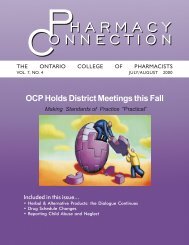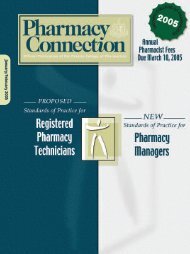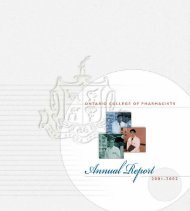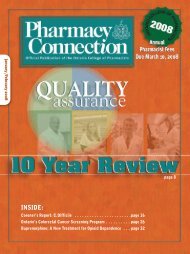January/February 2004 - Ontario College of Pharmacists
January/February 2004 - Ontario College of Pharmacists
January/February 2004 - Ontario College of Pharmacists
You also want an ePaper? Increase the reach of your titles
YUMPU automatically turns print PDFs into web optimized ePapers that Google loves.
DOCUMENTATION<br />
Q A&<br />
Q A<br />
Greg Ujiye, R.Ph., B.Sc.Phm.<br />
Manager, Pharmacy Practice Programs<br />
When should I document?<br />
Q<br />
<strong>Pharmacists</strong> should document specific or important information<br />
when providing care for patients. The information<br />
should be relevant to the continuity <strong>of</strong> care and could be<br />
clinical in nature or notes <strong>of</strong> communication with other<br />
providers. Information should also be documented when<br />
you exercise pr<strong>of</strong>essional judgement. You should also<br />
consider documenting situations where questions may arise<br />
in the future (e.g. third-party plans).<br />
What should I document?<br />
Q<br />
Information that is relevant to the care <strong>of</strong> the patient should<br />
be noted. This can include specific advice that you have<br />
given to the patient or other health care pr<strong>of</strong>essionals and<br />
specific information received from those individuals relevant<br />
to care. While the diagnosis may not be available, a<br />
patient’s condition or reason for treatment may prove more<br />
pertinent. Documenting relevant information that cannot<br />
be confirmed may also be a wise practice.<br />
Where should I document?<br />
Q<br />
Depending on the situation, documentation can be made on:<br />
• The prescription hard copy whenever the information is<br />
relevant to that order (i.e. authenticity <strong>of</strong> prescription,<br />
question <strong>of</strong> dose, etc.)<br />
• A patient screen on your pharmacy computer program (i.e.<br />
allergy, referral to physician prior to next refill, etc.); or<br />
• In a manual patient filing system where other cognitive<br />
services may be documented<br />
What do I document if I have concerns about a<br />
Qprescription?<br />
Every pharmacist is ultimately responsible for his/her practice<br />
and you can refuse to fill a prescription if you believe the<br />
patient can be harmed. Contact the prescriber whenever<br />
you have concerns about filling a prescription. If your<br />
concerns remain and you believe the patient may be<br />
harmed, you can refuse to fill the prescription. Document<br />
the rationale for your concerns and any intervention you<br />
might have made. However, you should discuss an alternate<br />
plan with the patient and/or physician if your refusal to fill<br />
the prescription could put the patient at any risk.<br />
Does the <strong>College</strong> have forms for<br />
Qdocumentation?<br />
No. The <strong>College</strong> does not foresee developing any such<br />
form as there are many different systems for documenting.<br />
The most important point to remember is to find or<br />
develop a documentation system that works best for you,<br />
keeping in mind pharmaceutical principles and pr<strong>of</strong>essional<br />
standards.<br />
Pharmacy Connection <strong>January</strong> • <strong>February</strong> <strong>2004</strong> 13


